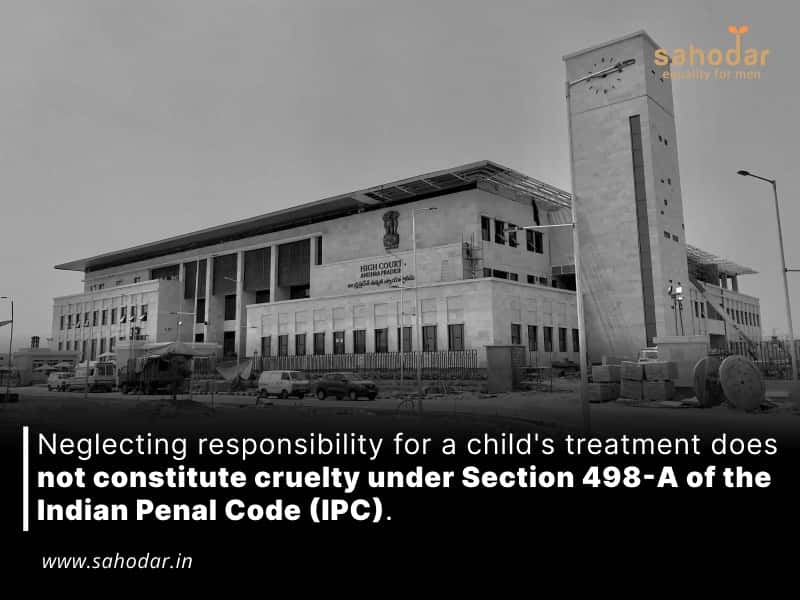The Andhra Pradesh High Court recently dismissed a criminal case filed by a woman against her husband and in-laws, ruling that neglecting a child and refusing to take responsibility for their treatment does not constitute cruelty under Section 498-A or criminal intimidation under Section 506 of the Indian Penal Code. The case was filed beyond the period of limitation and was not made out, according to the court. The husband and in-laws had petitioned the court to quash the case, which was filed under Sections 498-A, 509, 506, 354 r/w 34 of the IPC.
In contrast, the wife who was the respondent in the case argued that the husband and in-laws were guilty of cruelty and criminal intimidation because they did not visit the child or take responsibility for the child’s treatment.
In November 2011, the petitioner husband and de facto complainant wife got married. Later, the wife accused her husband and in-laws of subjecting her to harassment and mistreatment for the purpose of extorting money from her parents.
In September 2015, the wife gave birth to a son and was sent to her matrimonial home. Allegedly, neither her husband nor any of her in-laws took care of her or the child. The wife further claimed that her son required an operation for a problem in his testicles, but the petitioner husband and in-laws did not provide any financial assistance.
In light of these allegations, the wife filed a complaint against the husband and in-laws for offenses under Sections 498-A, 506, 354 r/w 34 of IPC.
Following the investigation, the Additional Junior Civil Judge, Narasaraopet took cognizance of the case for the offenses under Sections 498-A, 509, 506, 354 r/w 34 of IPC. The husband and in-laws, the petitioners, then filed a criminal petition in the High Court seeking to quash the case. Their counsel argued that the complaint was filed after the period of limitation set out in Section 468 of Cr.P.C. had expired. Moreover, he contended that the order of cognizance was flawed due to a lack of reasons disclosing the Magistrate’s satisfaction and clear non-application of mind. The counsel further emphasized that once Section 354 of IPC is excluded from the charge sheet, all other offenses do not attract a punishment of more than three years, and the limitation for filing a complaint under these provisions would be three years from the date of the offense. Since all allegations related to offenses before November 2015, and the complaint was filed in May 2019, which is beyond the period of three years, he argued that the complaint could not have been entertained.
After taking cognizance of the case for offences under Sections 498-A, 509, 506, 354 r/w 34 of IPC, the Additional Junior Civil Judge, Narasaraopet started the proceedings. The husband and in-laws, however, approached the High Court by way of a criminal petition seeking the quashing of the case. Their counsel argued that the complaint was filed beyond the period of limitation set out under Section 468 of Cr.P.C. and hence could not have been entertained. He further contended that the order of cognizance lacked reasoning disclosing satisfaction of the Magistrate and suffered from non-application of mind. The counsel also pointed out that since Section 354 of IPC was excluded from the charge sheet, all other offences did not attract punishment of more than three years, and the complaint could only have been filed within three years from the date of offence. As all the allegations related to offences prior to November 2015 and the complaint was filed in May 2019, which was beyond the period of three years, he argued that the complaint was not maintainable.
Moreover, the court analyzed that the complainant had filed the complaint beyond the prescribed time limit of three years from the date of returning to her parents’ home, which would render the complaint under Sections 498-A, 509 or 506 of IPC time-barred.
The court then examined whether the subsequent incidents alleged by the wife constituted harassment that would extend the period of limitation. The court noted that the allegations concerning the later period mainly comprised of neglect and refusal to visit or meet the complainant or her child. The court stated that it needs to be determined whether such behavior would come under any provisions of the charge sheet.
Upon scrutinizing Sections 506 and 509 of the IPC, the court opined that “the allegations made against the petitioner, for neglect and refusal to take up responsibility for the treatment of the child of the complainant would not fall under either of these provisions”.
The court then analyzed whether the alleged neglectful actions would fit under Section 498-A of the IPC. It concluded that they would not. Therefore, the court held that the complaint by the de facto complainant was beyond the prescribed period under Section 468 of the Cr.P.C.
The court also referred to the Supreme Court’s ruling in Kamlesh Kalra vs Shilpika Kalra & Ors, which held that a complaint filed over three years after a couple’s separation would be barred by limitation. As a result, the criminal petition was granted, and the case on the file of the I Additional Junior Civil Judge, Narasaraopet was quashed.
Source: https://www.livelaw.in/news-updates/andhra-pradesh-high-court-judgment-section-498a-ipc-cruelty-treatment-child-neglect-225365

